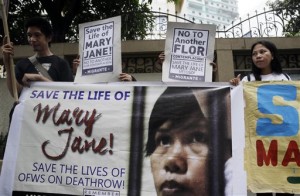
Supporters display placards outside the Indonesian Embassy at the financial district of Makati city, east of Manila, Philippines during a picket Wednesday, April 8, 2015 to ask for clemency for convicted drug trafficker Mary Jane Fiesta Veloso. Malaysia, Saudi Arabia and China top the list of countries where there are Filipinos on death row with 34, 28 and 21 Philippine nationals, respectively, according to Malacañang. AP
Malaysia, Saudi Arabia and China top the list of countries where there are Filipinos on death row with 34, 28 and 21 Philippine nationals, respectively, according to Malacañang.
Citing a report by the Department of Foreign Affairs, the Palace on Sunday said there were also two Filipinos on death row in the United States and one each in Indonesia, Kuwait and Thailand, bringing to 88 the total number of Filipino facing the death penalty.
Communications Secretary Herminio Coloma Jr. told the Inquirer, however, that “no case is imminent for execution.”
“All death penalty cases are either already given a reprieve or are on appeal,” Coloma said in a text message.
“The death penalty with a two-year reprieve could be commuted to life imprisonment for good behavior,” said Coloma, quoting Foreign Affairs Assistant Secretary and spokesperson Charles Jose.
Assistance
According to Coloma, all Philippine embassies and consulates had been directed by Malacañang to extend all the help necessary to Filipinos on death row under the DFA’s Assistance to Nationals program, including legal assistance and appeals coursed through diplomatic channels.
“On the preventive side, extensive education and information are conducted by the Department of Labor and Employment and its attached agencies in collaboration with the Philippine Information Agency and other government media organizations,” Coloma said.
Massive
Already, he said, a massive information and education campaign against drug and human trafficking was being conducted in the country’s regions and provinces to educate overseas Filipino workers (OFWs) while they are still in the country.
He also raised the need to increase awareness on the perils posed by human and drug trafficking syndicates, particularly an intensified information drive on the issue among OFWs and other Philippine nationals based abroad.
It is necessary for OFWs to know and comply with the laws of their host countries, he said.
In China, trafficking in illegal drugs is punishable by a prison terms of at least 15 years, life imprisonment or death, the DFA said.
In most Muslim countries, the offense is punishable by death under Sharia law.
Coloma said the government was doing everything to protect the rights of Filipino citizens in trouble in the various parts of the world.
Citing the case of drug convict Mary Jane Veloso, he said a criminal syndicate had duped the Nueva Ecija native into “being an unwitting accomplice or courier in their human and drug trafficking activities.”
Last Wednesday, Veloso was given a last-minute reprieve after President Aquino brought up her case with Indonesian President Joko Widodo.